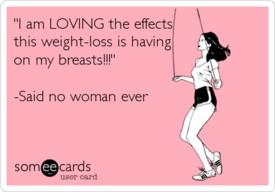Starvation mode and net calories......

KarenJean91
Posts: 283 Member
Don't really know how to start this so i'll just get right to the point........ I don't eat back my exercise calories. Today I ate my goal of 1300 calories but burned 450 of them, leaving me with a net intake of 850 calories. Is that setting my body up for starvation mode? i really don't like to eat back calories.... will this hinder my weight loss?
Sorry if there's already a post similar to this one.
Sorry if there's already a post similar to this one.
0
Replies
-
I ate 1300 cals for breakfast. Good luck with your goals.0
-
Fat loss results when you provide your body with less total energy in the form of calories than what it uses in a given day when considering every means of energy expenditure (RMR, exercise, non-exercise activity, and food absorption).
For instance, I need to eat 2900 calories just to maintain weight while lifting five days a week. I am reducing fat mass consistently simply because I am eating 2650 calories a day, for a 250 calorie deficit while maintaining my five day lifting program (no increase in activity). One major reason I assume a small deficit is that we all have a limit to how much fat that can be oxidized in 24-hours. Thus, persons with less fat cannot take on the same large deficits as those with far greater fat mass. The closer one gets to their fat oxidation limit, the more weight loss comes from fat-free mass loss.
Thus, fat loss is about ending with less energy than what your body needs to maintain weight relative to activity. With that said, why not lose fat while eating the most amount of calories instead of eating the minimum? I will not go into the topic of starvation mode, but regardless of how significant the deficit, we all experience these alterations: reduced RMR, reduced fat-free mass, reduced leptin, etc. The greater the deficit, and the longer you maintain said deficit, will result in greater changes to the above. With that said, its preferable if one chooses a smaller deficit since it is not so restrictive which makes compliance and returning to maintenance a lot easier and less stressful.0 -
I was wondering the same thing. I'm doing a 20 week weight loss contest at my Y which is being led by a nutrionist and director of our fitness classes. I'm going to ask her tomorrow when I report my how my week went, I'll let you know how her response. I'm trying to eat 1290 calories and have been burning 350-600 calories a day. Some days I eat part of those calories, some days I don't but I'm not sure which I should be doing. I have lost 5 pounds in 11 days, so I'm going something right.:happy:0
-
I am not sure but I've heard that a minimum of 1,000 calories is necessary or your body will go into starvation mode and that does not help to lose weight. I would be careful.0
-
I think short term now, but long term yes. I was on the LCD (very low calorie diet) for awhile. In the beginning I was eating around 1200 cals a day and burning like 300-400 in exercise. I lost weight like crazy! Nearly a pound a day. After awhile I cut back to even less. I couldn't lose weight. I was miserable. Hungry, ill, no energy. When I ate more, I felt better and lost weight.0
-
I ate 1300 cals for breakfast. Good luck with your goals.
Good for you. I'm sure we've both know our bodies well enough to know what's best for them.0 -
I was wondering the same thing. I'm doing a 20 week weight loss contest at my Y which is being led by a nutrionist and director of our fitness classes. I'm going to ask her tomorrow when I report my how my week went, I'll let you know how her response. I'm trying to eat 1290 calories and have been burning 350-600 calories a day. Some days I eat part of those calories, some days I don't but I'm not sure which I should be doing. I have lost 5 pounds in 11 days, so I'm going something right.:happy:
Cool, thank you!! Please let me know 0
0 -
Id be interested to hear what your nutritionist says.0
-
-
From all the stuff I've read, it sounds like you do need to be careful about harming your metabolism. You will lose weight eating so few calories, but you will also gain that weight back quickly because you are slowing down your metabolism by training your body to do as much as it is with less fuel. Check out cutthefatpodcast.com. It has lots of good info for burning fat and keeping it off for the long term.0
-
This! I have heard starvation mode takes a while to "kick in" but that low of an intake is undoubtedly too low... read this it explains EVERYTHING! good luck 0
0 -
Fat loss results when you provide your body with less total energy in the form of calories than what it uses in a given day when considering every means of energy expenditure (RMR, exercise, non-exercise activity, and food absorption).
For instance, I need to eat 2900 calories just to maintain weight while lifting five days a week. I am reducing fat mass consistently simply because I am eating 2650 calories a day, for a 250 calorie deficit while maintaining my five day lifting program (no increase in activity). One major reason I assume a small deficit is that we all have a limit to how much fat that can be oxidized in 24-hours. Thus, persons with less fat cannot take on the same large deficits as those with far greater fat mass. The closer one gets to their fat oxidation limit, the more weight loss comes from fat-free mass loss.
Thus, fat loss is about ending with less energy than what your body needs to maintain weight relative to activity. With that said, why not lose fat while eating the most amount of calories instead of eating the minimum? I will not go into the topic of starvation mode, but regardless of how significant the deficit, we all experience these alterations: reduced RMR, reduced fat-free mass, reduced leptin, etc. The greater the deficit, and the longer you maintain said deficit, will result in greater changes to the above. With that said, its preferable if one chooses a smaller deficit since it is not so restrictive which makes compliance and returning to maintenance a lot easier and less stressful.
Thank you. That's such a clear explanation.0 -
With that said, its preferable if one chooses a smaller deficit since it is not so restrictive which makes compliance and returning to maintenance a lot easier and less stressful.
I have to say, that is one of the best things I've ever seen said on the subject. Kudos for being informative, encouraging, and nonjudgmental. :drinker:0 -
You can lose weight very quickly eating about 850 calories/day net. You will also likely reduce your basal metabolic rate so that when you start eating "maintenance", your body actually needs less so it stores more as fat, you regain the weight and then some. But if that's what you like doing... :drinker:0
-
You can lose weight very quickly eating about 850 calories/day net. You will also likely reduce your basal metabolic rate so that when you start eating "maintenance", your body actually needs less so it stores more as fat, you regain the weight and then some. But if that's what you like doing... :drinker:
yes. I agree eating that low amount will not benefit you in the long run.
treat your body right.0 -
So what everyone is trying to say, is to eat them back? I'm confused. I thought 1300 was a safe amount of calories to eat to lose weight...0
-
Yes it is safe. And widely accepted. For sedentary people. If you workout hard you should eat the calories. If all you're doing is light walking, don't eat them back.0
-
So what everyone is trying to say, is to eat them back? I'm confused. I thought 1300 was a safe amount of calories to eat to lose weight...
But you are not GETTING 1300 .... because you are burning them up.0 -
Everyone's different but not eating back my calories makes me sick and when I'm sick I can't work out, it was a vicious cycle until I finally figured out that my body needs fuel and I had to stop starving myself. It was a huge breakthrough for me and now I find I can work out harder then I ever thought I could.0
-
So what everyone is trying to say, is to eat them back? I'm confused. I thought 1300 was a safe amount of calories to eat to lose weight...
There's no right answer to "safe amount". It depends on a ton of factors: Current weight, exercise levels, activity levels throughout the day, even genetics and metabolism to a certain extent. That said, you are not eating anywhere near enough at 850 net calories while doing 450 calories worth of exercise and being 10-15 pounds above your goal weight and a 5'6" woman. That is the kind of deficit that might work for a very overweight or inactive person, but you're neither. Actually, a quick look at the BMI table tells me that you're not overweight, at all, and are in fact in the second percentile square of "normal". Your goal will put you in the second percentile of underweight.
You're bordering on anorexic here girl. You should probably rethink your goals. If you're not happy with the way you look think about body recomposition rather than weight loss. Eat at or even a little above maintenance and add strength training into your exercise routine. You don't need to lose weight, and you certainly don't need to lose 15 pounds.0 -
Here is a different take on Starvation Mode, for what it's worth: http://www.weightwatchers.com/util/art/index_art.aspx?tabnum=1&art_id=355010
-
I once was on a diet for months where was eating 1200 calories and less than 20 grams of fat a day, and working out for hours each day. I got seriously sick; I was fainting, my hair was falling out, my heart beat slowed...My nutritionist said I needed to be eating at least 1500 calories and 50 grams of healthy fat each day. Everyone is different, but 850 total calories is nowhere near enough to sustain somebody who is working out.0
This discussion has been closed.
Categories
- All Categories
- 1.4M Health, Wellness and Goals
- 398.4K Introduce Yourself
- 44.7K Getting Started
- 261K Health and Weight Loss
- 176.4K Food and Nutrition
- 47.7K Recipes
- 233K Fitness and Exercise
- 462 Sleep, Mindfulness and Overall Wellness
- 6.5K Goal: Maintaining Weight
- 8.7K Goal: Gaining Weight and Body Building
- 153.5K Motivation and Support
- 8.4K Challenges
- 1.4K Debate Club
- 96.5K Chit-Chat
- 2.6K Fun and Games
- 4.8K MyFitnessPal Information
- 17 News and Announcements
- 21 MyFitnessPal Academy
- 1.5K Feature Suggestions and Ideas
- 3.2K MyFitnessPal Tech Support Questions
















